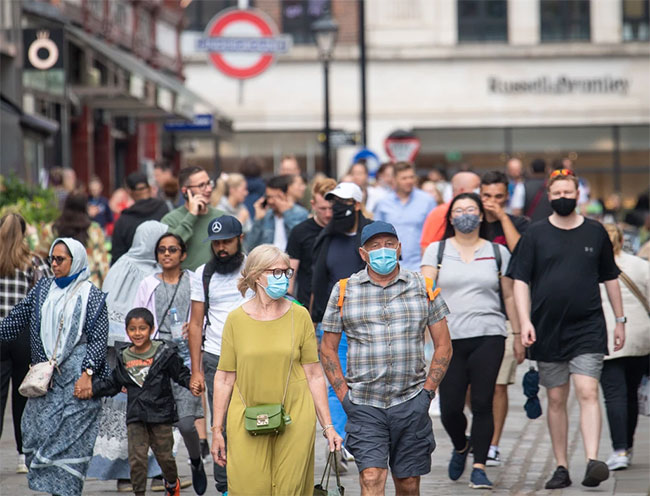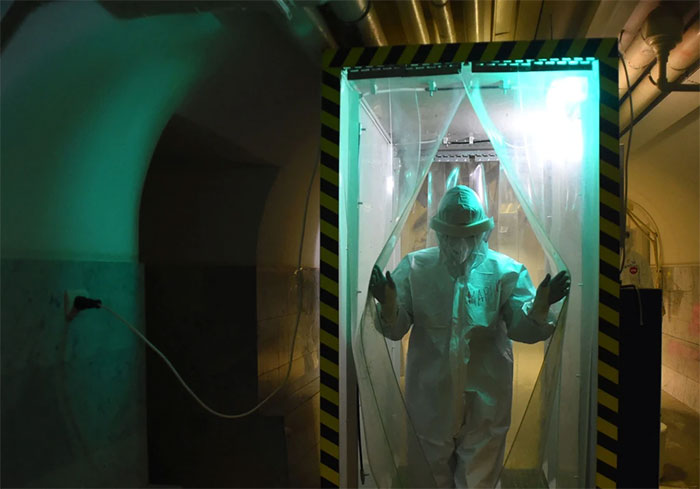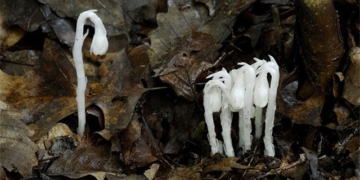The Delta variant was first identified a year ago and is currently dominant worldwide. Experts are concerned that a new strain may replace it.
Every week, a group of epidemiologists across the northeastern United States meets via Zoom to discuss new variants of the nCoV virus emerging globally.
“It’s like a weather report. We used to have Gamma appearing in some places, Alpha too. But now, the world is covered by the Delta variant,” said epidemiologist William Hanage from Harvard T.H. Chan School of Public Health.
Two Scenarios
Since the Delta variant was first detected in India in December 2020, it has become widespread, quietly spreading around the globe. According to the World Health Organization (WHO), 99.5% of reported gene sequences are Delta variant infections.
Meanwhile, new variants continue to emerge, notably AY.4.2 or Delta Plus in the UK. Health officials estimate these variants may be 10-15% more transmissible. Although data is incomplete, experts observe that these variants are nearly identical to Delta, except for some minor peculiar mutations. Hanage refers to them as “descendants” of Delta and asserts that they cannot spread more dangerous diseases.
However, the reason Hanage and his colleagues continuously scan databases like Pangolin and Nextstrain and discuss weekly via Zoom is to predict what might happen next. Is Delta the final variant of the Covid-19 pandemic, or is something frightening preparing to emerge in the future? No one can be certain about the answer to that question.

The high rate of nCoV transmission increases the likelihood of dangerous variants emerging. (Photo: Dominic Lipinski/PA).
One possibility is that after a sudden leap in the genetic sequence of nCoV, the virus produced the first variant named Alpha, followed by Delta. Now, SARS-CoV-2 may mutate slowly, stabilize, and eventually escape the control of current Covid-19 vaccines, but this could take years. Meanwhile, scientists continue to challenge their own speculation. Some believe this is the most likely scenario.
Francois Balloux, Director of the UCL Genetics Institute, predicts: “The kind of evolution we will see is similar to what is called antigenic drift – the virus gradually evolves to escape the immune system. For influenza and other coronaviruses we know quite well, it takes about 10 years for the virus to accumulate enough changes that antibodies in the blood do not recognize it.”
But another scenario has also been proposed. This is the sudden emergence of a completely new nCoV variant with the potential for higher transmissibility, virulence, or immune evasion characteristics. This could create a new dynamic for the pandemic. Professor Ravi Gupta from the University of Cambridge refers to them as “super variants” and is confident that there is an 80% chance one will emerge. The question is when.
“We are living in the ‘Delta pandemic’. The Delta Plus variant is relatively fragile with two mutations from Delta. I don’t think they are concerning, and they are not thriving in other countries. However, it is inevitable that another variant in the next two years will compete with Delta and surpass it,” Professor Gupta added.
Will We See a Super Variant?
In the latter half of 2020, epidemiologists began to observe signs of viral recombination. Different versions of nCoV appeared with alternative mutations, combining to form entirely new strains.
Professor Gupta notes that fortunately, this phenomenon is not common, but it remains a plausible scenario for generating a super variant. Especially in areas with a large unvaccinated population where the virus can spread effectively.
“Delta is currently the dominant strain, which makes the likelihood of a super variant occurring even lower. However, in vast regions of the planet where we cannot sample, we don’t know what will happen. Therefore, this is a very plausible scenario,” the professor stated.

Some opinions suggest that the use of antiviral pills, especially Molnupiravir from Merck, may contribute to the evolution of nCoV. (Photo: Merck & Co Inc/Reuters).
Additionally, a series of significant mutations could either enhance the current Delta strain or “transform” it into a new variant. Professor Gideon Schreiber from the Weizmann Institute of Science in Israel warns: “More complex mutations may develop simultaneously at multiple sites. This could cause more problems.”
In recent weeks, another concern has emerged. The use of antiviral pills, particularly Molnupiravir from Merck, may contribute to the evolution of nCoV. Molnupiravir works by interfering with the virus’s replication, fragmenting its genetic material with mutations until it can no longer replicate.
Some virologists argue that any nCoV mutation that exists and spreads to other hosts promotes the emergence of new variants. Other researchers acknowledge that this needs to be monitored, but they cannot refuse to use a drug that could save patients’ lives.
According to Professor Gupta, a bigger issue that could lead to the emergence of super variants is the continuously high transmission rates in countries with high vaccination coverage, such as the United Kingdom.
“The more infections there are each day, the higher the chance that patient X is infected with the virus and their T cells are not strong enough to eliminate nCoV. They will be ill for some days, and this is the time that allows the virus to refine its immune evasion capabilities, after which it can spread to others,” Gupta said.
Earlier this year, Professor Gupta published a paper showing that this process could occur in severe cases of Covid-19, where convalescent plasma containing virus-neutralizing antibodies was used. Their immune systems were not strong enough to eliminate the virus, resulting in the virus learning how to adapt to those antibodies.
The authors predict that the use of convalescent plasma in the early stages of the pandemic is also a reason for the emergence of new variants, primarily in Brazil, India, the UK, and the US. All these countries have reported new variants.
Arms Races
Epidemiologists are trying to model what a super variant might “look like.” So far, the main changes in the gene sequence of nCoV remain the factors that enhance its transmissibility.
Hanage explains that one reason Delta has a significant impact globally is that it develops rapidly in human cells before the immune system is activated. As a result, individuals carrying the Delta variant have viral loads in their noses that are 1,200 times higher than the original strain. They also develop symptoms 2-3 days earlier.
This is the result of natural selection. Different copies of nCoV are always being produced, but the copies that survive and become prevalent are those that have a much higher transmissibility to healthy individuals. However, in countries like the UK, the percentage of the population that remains unvaccinated is gradually decreasing, and this could change. New variants will surpass antibodies, resulting in super variants carrying superior traits, evading at least part of the immune response.

Healthcare workers disinfecting the Covid-19 treatment area at Mariinsky Hospital, Saint Petersburg, Russia, on July 7. (Photo: AFP).
Hanage states: “The virus strains that ultimately survive and become prevalent depend on the stage of the outbreak. So far, transmission into the unprotected group by the vaccine remains very important for nCoV. But that will change.”
Nevertheless, this is not necessarily bad news. Covid-19 vaccines are designed with the evolution of the virus in mind. Additionally, a second generation of vaccines is currently being developed. Novavax is hoping for approval in the coming months, while many other vaccines will also be released from now until 2023. These developments will help combat new variants in the future.
For example, Gritstone Pharmaceuticals in the US is conducting phase I clinical trials for a second-generation Covid-19 vaccine. They are sequencing all existing nCoV strains and creating antibodies that neutralize conserved areas of the virus.
However, epidemiologists believe that relying solely on vaccines is insufficient. Even if we find ways to coexist with Covid-19, as in the UK, there are still some restrictions needed to prevent the spread of the virus and reduce opportunities for it to mutate.
According to Professor Gupta: “Currently, the number of cases is very high, so preventing new infections will be much better. We should not go to crowded places or enter buildings without wearing masks. All new variants emerge in countries with very high transmission rates and no control measures, such as India, the UK, and Brazil. That is also why no new variants have been found in Singapore or South Korea.”


















































